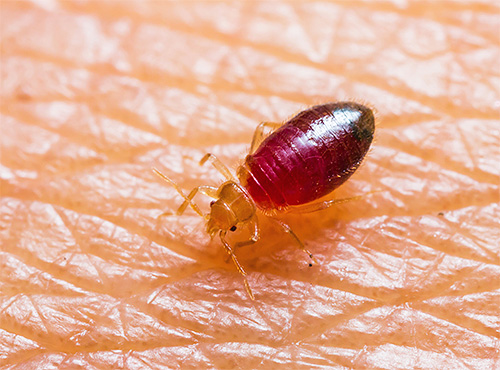
Insect allergy (from the word insect, which means an insect), which also includes an allergy to bedbug bites, is nothing more than an enhanced response of the human immune system to foreign bodies. However, today it represents a real medical problem.
Immunity weakened by poor ecology and a sedentary lifestyle, together with genetic predisposition, can produce a powerful reaction even to those substances that do not carry a global threat to humans. Such allergens include substances contained in the saliva of blood-sucking insects, in particular, bed bugs.
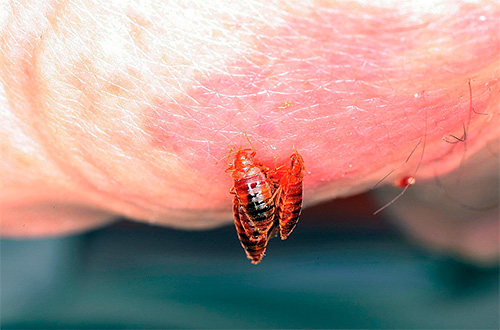
Allergy to bedbugs can manifest itself not only in the reaction to the bites of these insects, but also to the products of their vital activity: excreta, as well as chitinous covers discharged during shedding. The following photo is an allergic reaction to bedbug bites eloquently shows how strongly the problem can be expressed:
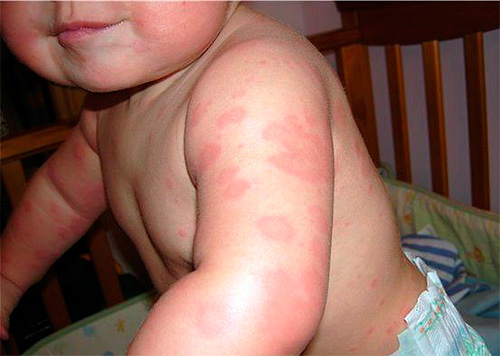
It is important to know
Insects such as bees, wasps, bumblebees, and hornets, whose poison is a very strong allergen, are mainly dangerous for residents of middle latitudes. For example, in the USA about 50 people die every year due to an extensive allergic reaction to sting of bees or wasps. However, bites from bedbugs, ticks, fleas, and mosquitoes that may be carriers of encephalitis, malaria, and even plague are no less a threat to humans.
Why do allergies occur?
During the bite, bugs secrete highly allergenic anesthetics and substances preventing blood clotting into the wound. From this point on in the human body begins the response to the bug of the bug, in particular, the damaged places turn red and swell. The following photo of allergy to bedbug bites clearly shows such redness:
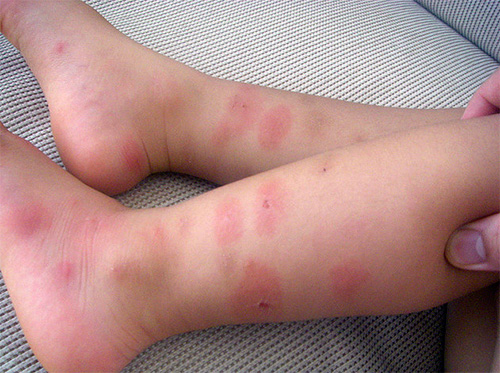
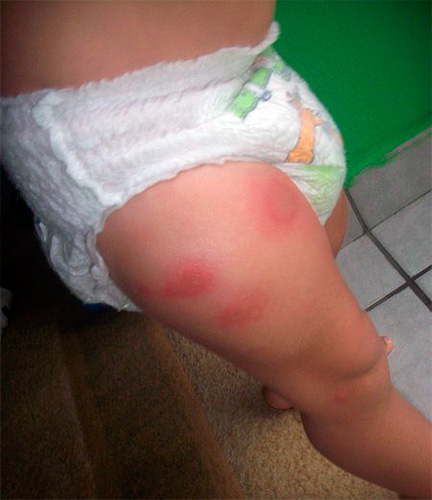
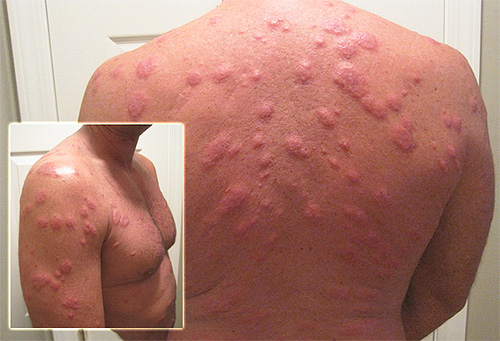
Moreover, the bitten places begin to itch, and this itching shows that the human immune system actively took over the work. Faced with alien bodies, the body vigorously secretes histamine, a special substance that triggers a complex process of the immune response.
Histamine activates the work of leukocytes, which in turn contributes to the occurrence of inflammatory processes in the tissues, due to which the blood vessels dilate and their permeability increases. This helps the immune cells to quickly reach and eliminate pests or organisms.
Of course, the human body itself suffers. Due to contractions of the bronchi and edema of the nasal mucosa, harmful substances are removed from the body through coughing or sneezing, but at the same time, a reduction in the muscles of the bronchi can cause asphyxiation, and a sharp expansion of blood vessels can lead to a serious drop in blood pressure. That is why many antiallergic drugs are called antihistamines, because they are aimed at suppressing the excessive production of histamine.
What is the danger of a bug bite for adults?
Among the various allergic reactions to the bug bite can be distinguished local reactions and general. In most cases, the effects of bedbug bites are limited to such local reactions as:
- itching;
- slight swelling;
- redness at the site of the bite.
By and large, such manifestations of allergy can go away after a while on their own. You can remove them by imposing a cold compress on the bite site or modern antipruritic ointments and balms (see photo):
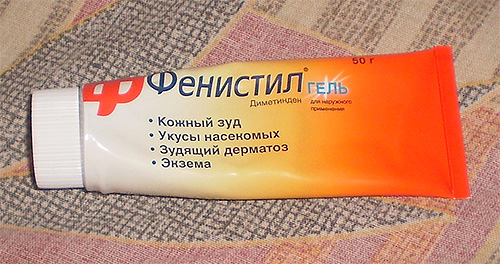
One of the dangers of local allergic reactions is that the damaged areas are very itchy. If they are intensively combed, then pustules appear on the skin, which open the gates for new infections.
In addition, bed bugs can sometimes cause general body reactions, especially if a person has already suffered from allergies in the past. Moreover, in order to have a serious reaction to the bite or to the waste products of the bug, it may be necessary to have a very small amount of the allergen.
Such generalized allergic reactions include:
- urticaria, which manifests itself in the appearance of itchy reddish wheals, which resemble a nettle burn;
- runny nose and lacrimation, which can be confused with the beginning of acute respiratory infections;
- bronchospasm, which can cause serious breathing problems if urgent measures are not taken;
- Quincke edema, which mainly affects the areas of the face, but sometimes can capture the larynx and, accordingly, cause difficulty breathing;
- and even anaphylactic shock, when blood pressure drops sharply, suffocation occurs and immediate medical attention is required.
If the reaction is limited to a rash or runny nose, then you can try to cope with these manifestations of allergy yourself, using an antihistamine. If serious tissue swelling or shortness of breath occurs, the doctor may even prescribe corticosteroid-based drugs.
The photo below shows the waste products of bedbugs (excreta and chitinous skins after shedding), which, if inhaled, can cause a serious allergic reaction:
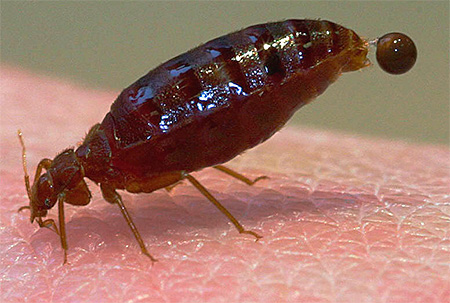
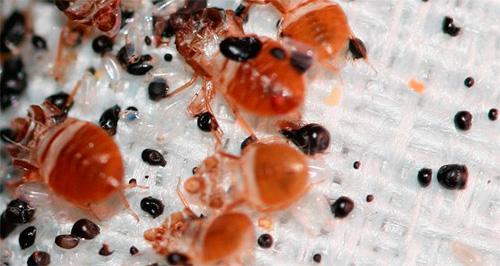
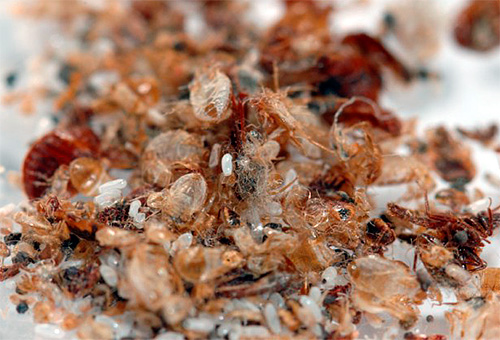
The manifestations of general allergy for pregnant women are dangerous, since at this time it is not recommended to take even modern antihistamines. In addition, dyspnea arising in the mother is fraught with a lack of oxygen in the future baby.
In this case, for the treatment of allergy to bedbug bites, you should definitely consult a doctor, especially if the woman has already had severe reactions to the bites of other insects.
Feedback
As far as I can remember, I have always had some kind of allergy: to dust, to cat's fur, to citrus fruits.And to the list of my misfortunes was added and an allergy to bedbugs. Once, when I came to a new acquaintance, I began to not just sneeze, my legs began to itch terribly and they began to swell before my eyes. It turned out that the sofa on which I was sitting was transported from my grandmother and simply was teeming with bedbugs! Now, when I go to visit, I first ask whether the furniture is new for people, no matter how rude it may seem to the owners.
Alena, Nikolaev
What consequences can a bug bite have in children?
It is believed that when the immune system is working normally, then allergic reactions are minimized. However, if it is weakened, broken, or not yet fully formed, as in children, then an allergy to bedbug bites can manifest itself very strongly.
In addition, the skin of babies is delicate and thin, and the blood circulation is intense, which makes the bugs in search of food more often attack on children.
Picture bedbugdrinking blood:
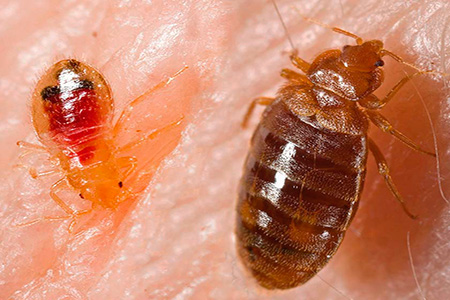
Asking yourself the question: “Are bedbug bites dangerous for a child?”, - parents should be fully aware that the children's body can respond to them several times stronger than an adult.
If for an adult male even multiple bites of bedbugs are completely capable of remaining unnoticed, then on the skin of babies and one bite will cause severe redness and itching, and, perhaps,and more severe consequences. The photo below shows the different manifestations of allergy to bedbug bites in children:
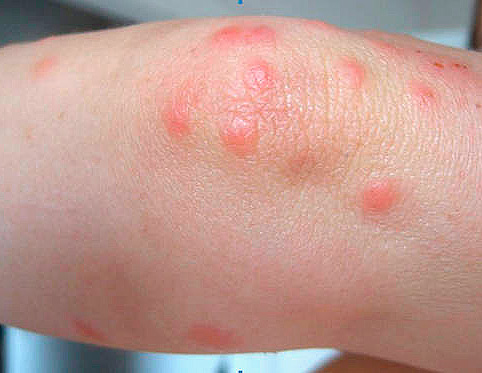
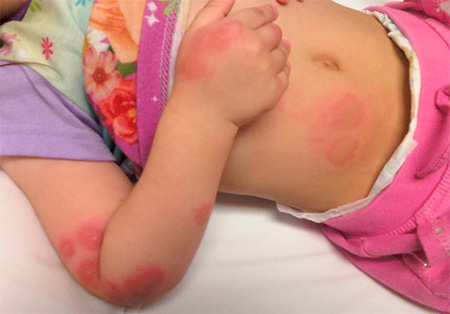
Feedback
We went with the child to the country to friends. I don’t know where they brought their sofas from, but she still has a night! The child tossed and grunted all night, and I myself thought that mosquitoes bite me. When I looked at my daughter's leg in the morning - and there was a chain of hefty red spots right there. It turned out to be bedbug bites. Smeared Fenistil and did not allow the child to itch, so it seemed that after a couple of days everything went away.
Tatyana, Kursk
First aid for allergies
If the bitten place is reddened and even blisters appear, then a cold compress should be applied to it. You can also lubricate it with Fenistil gel or Psilo-balm (especially if the crust has already appeared).
Tableted antihistamines for bedbug bites like Suprastin or Tavegil, or new-generation products with the active ingredient loratadine or cetirizine (Zyrtec, Cetrin, Loratadine, etc.) will also help relieve itching and swelling. With caution it is necessary to give antihistamines to young children up to three years old (for them there are special forms of drugs in the form of syrups and drops with the appropriate dosage).
Be sure to ensure that the child does not scratch the bite.distract him in many ways from the problem of itching. You can even short cut the nails to prevent infection in the wound.
A few more pictures of bedbug bites:
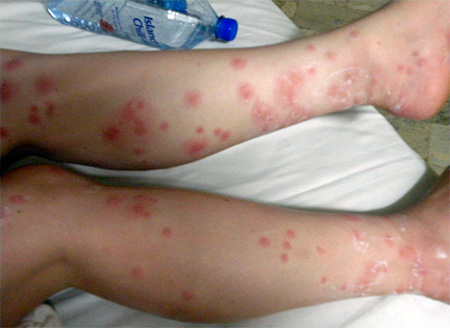
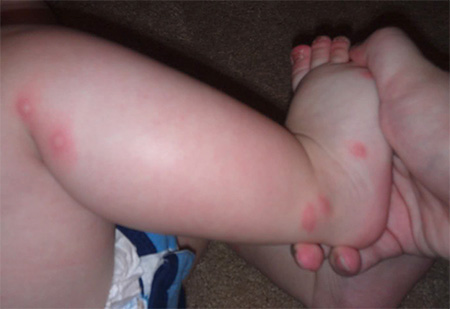
Simple improvised means of relieving itching and redness (at home and “in the field”) can be:
- crushed and superimposed on the site of the bite sheet of plantain;
- lotions with a tincture of the train (crushed leaves can be brewed in a thermos);
- treatment of affected areas with a solution of baking soda (a teaspoon for half a glass of water).
As a temporary option of scaring off bedbugs (for example, in a hotel or in a country house), you can try to pick and lay plants with a strong smell like wormwood, geranium, and tansy under the bed.
The best prevention of bed bugs allergy is, of course, their total destruction in the home. But what to do if the attack happened in nature, in the country, in a rented apartment on vacation?
The most optimal way out is to quickly leave the place infected with bedbugs. No matter how sorry it is spoiled leave, but we must understand that often repeated local and general allergies can gradually cause disruptions in the immune system and in the futurecause chronic allergic rhinitis or even asthma.
Interesting video about bed bugs and how to deal with them
Allergy to insect bites: what to do?

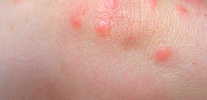
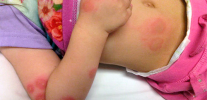
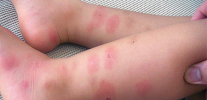
I, too, a month ago, allergies began, I do not know what. But I was at a friend's place, they had bugs there. I spent the night at their place and I don’t know if they bit me or not, but not noticeably. But after a few days of allergy - itchy eyes, lips swell. What to do, answer?